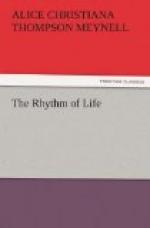PATHOS
A fugitive writer wrote but lately on the fugitive page of a minor magazine: ’For our part, the drunken tinker [Christopher Sly] is the most real personage of the piece, and not without some hints of the pathos that is worked out more fully, though by different ways, in Bottom and Malvolio.’ Has it indeed come to this? Have the Zeitgeist and the Weltschmerz and the other things compared to which ‘le spleen’ was gay, done so much for us? Is there to be no laughter left in literature free from the preoccupation of a sham real-life? So it would seem. Even what the great master has not shown us in his work, that your critic convinced of pathos is resolved to see in it. By the penetration of his intrusive sympathy he will come at it. It is of little use now to explain Snug the joiner to the audience: why, it is precisely Snug who stirs their emotions so painfully. Not the lion; they can see through that: but the Snug within, the human Snug. And Master Shallow has the Weltschmerz in that latent form which is the more appealing; and discouraging questions arise as to the end of old Double; and Argan in his nightcap is the tragic figure of Monomania; and human nature shudders at the petrifaction of the intellect of Mr. F.’s aunt. Et patati, et patata.
It may be only too true that the actual world is ’with pathos delicately edged.’ For Malvolio living we should have had living sympathies: so much aspiration, so ill-educated a love of refinement; so unarmed a credulity, noblest of weaknesses, betrayed for the laughter of a chambermaid. By an actual Bottom the Weaver our pity might be reached for the sake of his single self-reliance, his fancy and resource condemned to burlesque and ignominy by the niggard doom of circumstance. But is not life one thing and is not art another? Is it not the privilege of literature to make selection and to treat things singly, without the after-thoughts of life, without the troublous completeness of the many-sided world? Is not Shakespeare, for this reason, our refuge? Fortunately unreal is his world when he will have it




